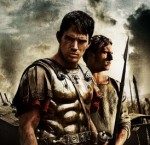We hope you enjoyed last month’s special program, 20 Christmas and Winter Solstice Songs. This month’s special program features music from The Eagle, and will be broadcast each Wednesday, Friday, and Sunday starting at 9PM ET and streaming until the next scheduled program. Enjoy.
The Eagle (Soundtrack) by Atli Övarsson:
Has The Eagle Landed?
Review by Richard Buxton
As an adaptation of ROSEMARY SUTCLIFFE’S novel THE EAGLE OF THE NINTH, director KEVIN MACDONALD brings the tale of a Roman soldier and his quest to retrieve the lost emblem of his father’s lost legion. The setting alone conjures vivid memories of the genre’s golden age and the numerous classic scores it has produced. Such history would suggest that films depicting the era of the Roman Empire provide a wealth of golden material and inspiration from which composers can feed. In terms of the blossoming career of ATLI ÖRVARSSON, this trend holds true. Having scored a number of worldwide releases, ÖRVARSSON’S work on THE EAGLE marks what is arguably his strongest effort in film scoring thus far.
The score introduces itself with the brooding “Testudo” (1), a heavily percussive piece strongly reminiscent of the more action-oriented compositions heard in GLADIATOR. A strong but ultimately predictable opening sets up the similarly evocative “Highlands” (2). The string harmonies dominated opening is swiftly replaced by the moody and atmospheric vocals that again bring ZIMMER’S score to mind. It is in this track however, that ÖRVARSSON’S provides the slightest reveal of the scores unique selling point. Slight hints of a Celtic influence appear throughout the opening moments of the track and these are fully reinforced in the following track, “The Return of the Eagle” (3). The influences can be heard instantly, providing an energetic and refreshing rhythm as the various instruments, including bagpipes come to the fore. The string and bagpipe motif alone might give some listeners the urge to take up dance lessons, but the swift emergence of the string section accompaniment enhances the cinematic flavour with it’s rising pattern, giving the track a pleasant and uplifting nature and cementing itself as one of the highlights of the score.
The first instance of what presents itself as a theme can be heard in “The Ninth Legion” (4), an ominous piece accented by a male choir that rises into a sweeping string theme. The theme reappears occasionally throughout the score in the tracks “I Will Return” (12) and “Beyond The Territories” (18), with both providing their own unique take on the theme, the former in the aforementioned Celtic demeanour. It is in these tracks that THE EAGLE finds its identity, rather than the less subtle and more dramatic action pieces. “May Your Souls Takes Flight” embodies this spirit as the bagpipes signal a rousing, string-propelled finale.
When ÖRVARSSON does venture into the action sequences of the film, the music does take a step down into the predictable. The music is suitably invigorating, but offers little more than has been heard countless times in similar films over the years. Tracks such as “North of the Wall” (5) emphasize this in their predictably percussive roots. The Celtic elements do provide reason for listeners to give the tracks more attention than they otherwise might however. The climactic moments of “Fleeing The Village” (15) are of a pleasingly fresh disposition and provide incentive for repeat listens.
Outside the previously mentioned tracks, THE EAGLE provides extensive underscore in the likes of “The Seal People” (9), “Searching” (10) and “Eagle Lost, Honour Lost” (14), all of which are fittingly atmospheric but are unlikely to be the catalyst for audiences to return to the score on multiple occasions.
The Eagle Soundtrack HD (transcoded from YouTube)
- #1 Testudo 2:48
- #2 Highlands 2:15
- #3 The Return of the Eagle 2:53
- #4 The Ninth Legion 2:19
- #5 North of the Wall 1:53
- #6 Honourable Discharge 2:37
- #7 Out Swords 2:53
- #8 May Your Souls Take Flight 4:12
- #9 The Seal People 2:39
- #10 Searching 3:52
- #11 Barbarians 2:46
- #12 I Will Return 2:20
- #13 Better Angry than Dead 1:49
- #14 Eagle Lost, Honour Lost 1:34
- #15 Fleeing the Village 3:27
- #16 Edge of the World 1:43
- #17 Esca’s Freedom 1:43
- #18 The Territories 4:34
(Note: There is no audio download for this program – please tune in via the MP3 Stream.)











Although Örvarrson’s compositions may not be fully unique — they may continue to bring a sound of novel curiosity to many of our people, who are not generally connected to a ‘kind’ of classical spirit of struggle & reward.
By way of Zimmer’s & Örvarrson’s cinematic scores — many whites have come to initially know or reacquaint with full-fledged classical music.
Hence, a good thing indeed!